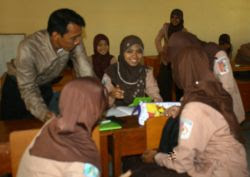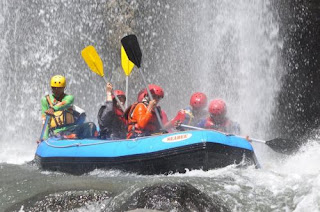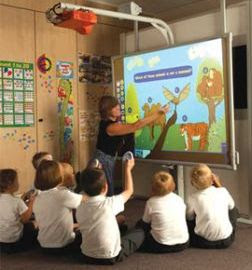T
he English language has become the most important second language of all in many countries worldwide. Everyone uses this language for many purposes, one of which is education. When we are talking about English language education, we also relate to how the English language is taught. Nowadays, learning English language is not only for adults, but also for children. However, both children and adults have different aspects in learning English. In this essay, the writer will discuss the different aspects of teaching English for adults and children with respect to the ability of acquiring second language, the materials, and the teaching method.
The first different aspect discussed is the different ability of acquiring second language. For children, learning English as their second language besides the mother language is pretty easy to do. According to some researches, children are able to gain the second language starting from about 5 until 12 years, which is often referred to as the golden age period. We will be easier to introduce children of those ages to the second language, including English. On the other hand, adults have the weakness in acquiring the second language maximally. It is because they already have passed the golden age period, of course. Perhaps, adults who have the capability of learning English naturally will not face any kind of difficulties but for those who don’t, learning English is quite difficult. Due to the less ability of acquiring the second language, teaching English for adults needs certain methods in order to be successful.
The second different aspect in English teaching for children and adults is related to the materials. The materials of teaching English are determined by the different level of ages. In teaching children, teachers have to be able to provide the materials simply and easily. Just because the children’s second language acquisition is better than adults, it does not mean teachers are allowed to give children as complex materials as those for adults. For children, the materials needed should be simple and meaningful. Usually, children are introduced to some simple expressions such as greetings or self-introduction. They can also be introduced to some simple vocabularies or nouns like animals, colors, parts of body, jobs, and so on. Different from that for children, English material for adults is more difficult. For adults, given materials are used in daily life context or for communication. As teachers, they can provide the materials about the job interview conversation, speech, debate, retell the experience, or another topic which aim at increasing their communication skill in daily life context.
The different teaching method of teaching English for children and adults is the last contrasting point which is discussed in this essay. In teaching children, the ability of getting their attention is required for teachers. As teachers, they have to deliver the materials in a unique and fun way. The fun learning method is an essential thing in teaching English at this stage of age. Mostly, children tend to be interested in playing and doing something with fun. Those are the keys for teachers to always give the materials in some interesting yet still meaningful ways. In addition, teaching children needs patience and awareness to grab them without making them feel disappointed or being ignored. Patience is related to how the teachers can get the students’ attention effectively. The less they can pay the attention to teachers, the more patience is needed for teachers. On the other hand, some interesting ways to teach English for adults is also required. The different is on how the teacher’s performance in teaching them. At this level, teachers have to be more skillful and capable of delivering the materials because the materials are quite difficult and useful for adults’ communication skill. In speaking, teachers should be more fluent because they are considered as the role-models for the students. Serious but fun ways can be applied to adults when they learn the English language. Teachers can be their facilitator and motivator for them. It will bring positive impacts on adults’ skill and comprehension of using this second language.
Teaching English for children and adults have different points which have to be recognized by the teachers. The different abilities of acquiring the second language, the given materials, and the teaching methods are some aspects which have to be paid serious attention by teachers. Teaching English is an amusing thing if we, as teachers, know whom we are teaching and how to deliver the knowledge effectively and efficiently.
Contributed by Monica Reinca Larasaty for Mister Guru.

















